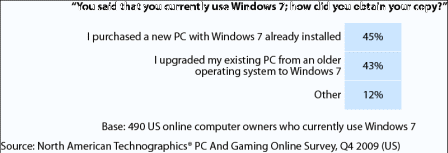Forrester: Windows 7 early adopters "satisfied"

According to two reports published by Forrester Research, a strong majority of US consumers are aware of the Windows 7 operating system, and consumers who were early adopters were generally very satisfied.
Yes, you read that right. Very satisfied. And I'd have to say that I see the same feelings amongst those who have upgraded. People, in particular those exposed to Vista, do indeed seem to be very happy with Windows 7.
As a rule, consumers don't buy new operating systems, they buy new computers. These computers come supplied with an OS. While us tech-geeks obsess over such details, to the average consumer the OS is seen as part of the PC, much like the hard drive or CPU. But this pattern seems to have been broken with Windows 7, where some 43% of those who moved up to Windows 7 did so by upgrading an existing PC.
J.P. Gownder, a consumer product strategy analyst at Forrester had the following to say:
In short, Windows 7 is a thinner client program than was Windows Vista, meaning that it works well on older hardware configurations. In the past, OSes were designed with Moore's Law as an underlying assumption -- that is, that newer PC hardware would be significantly faster and more powerful than the previous generation's hardware. Windows 7, however, is a less burdensome OS than Windows Vista.
According to Forrester, upgrading has never been so popular:
Among early adopters of Windows 7, in Q4, for the first time upgrading behavior matched replacement cycle purchasing.

A factor that Forrester don't mention is the economic downturn. Spending $120 on making a PC look new must have been a more attractive proposition for many than throwing down $800 to $1,000 for a new system.